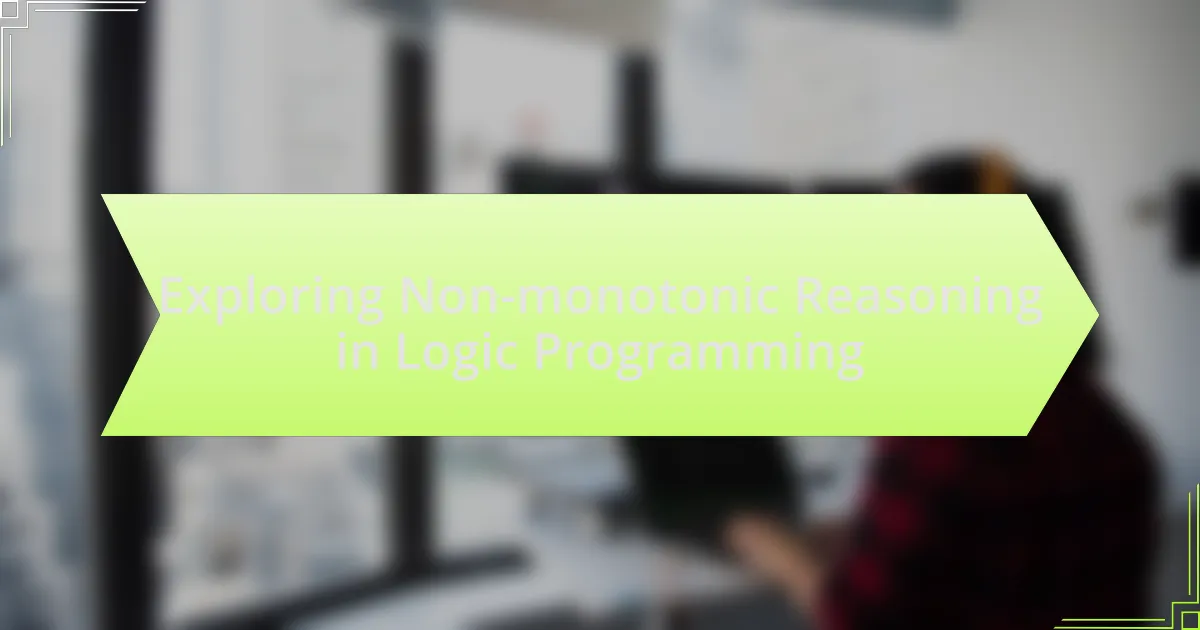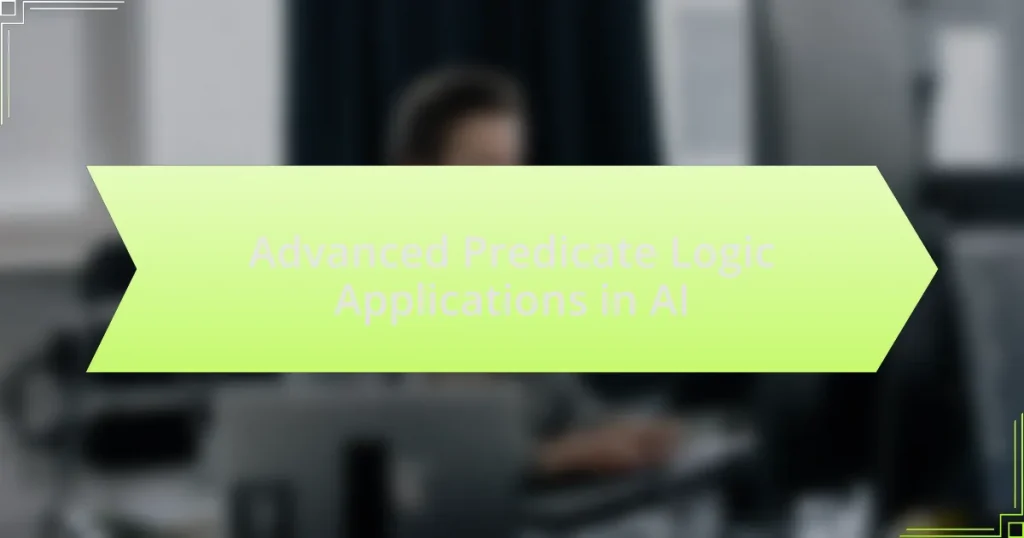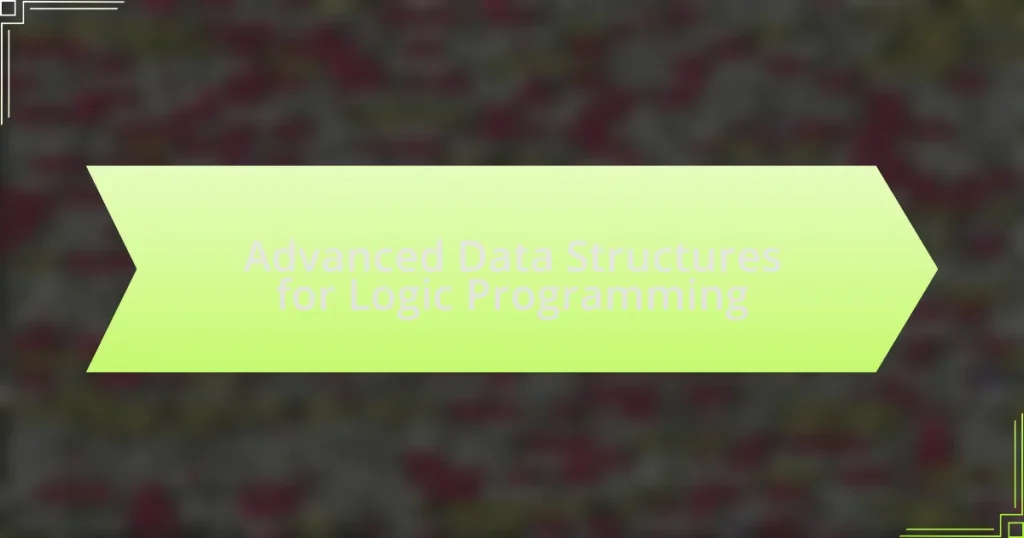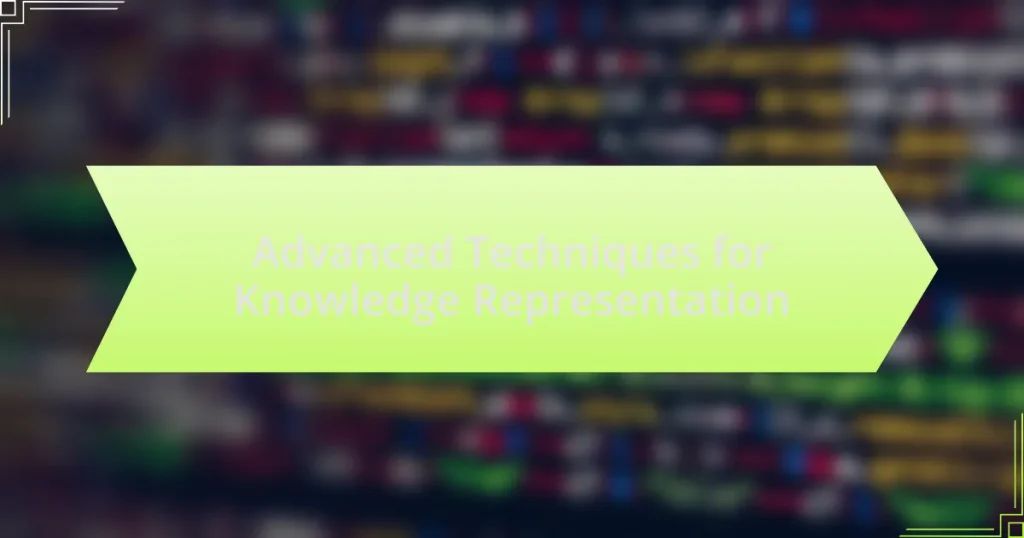Non-monotonic reasoning in logic programming is a type of reasoning that allows conclusions to be invalidated by new information, contrasting with traditional monotonic reasoning. This article explores the fundamental concepts, characteristics, and importance of non-monotonic reasoning, particularly in artificial intelligence and knowledge representation. It discusses various types of non-monotonic reasoning, such as default reasoning and belief revision, and highlights the challenges associated with inconsistencies and computational limitations. Additionally, the article examines emerging trends, best practices, and strategies for effectively implementing non-monotonic reasoning in practical applications.
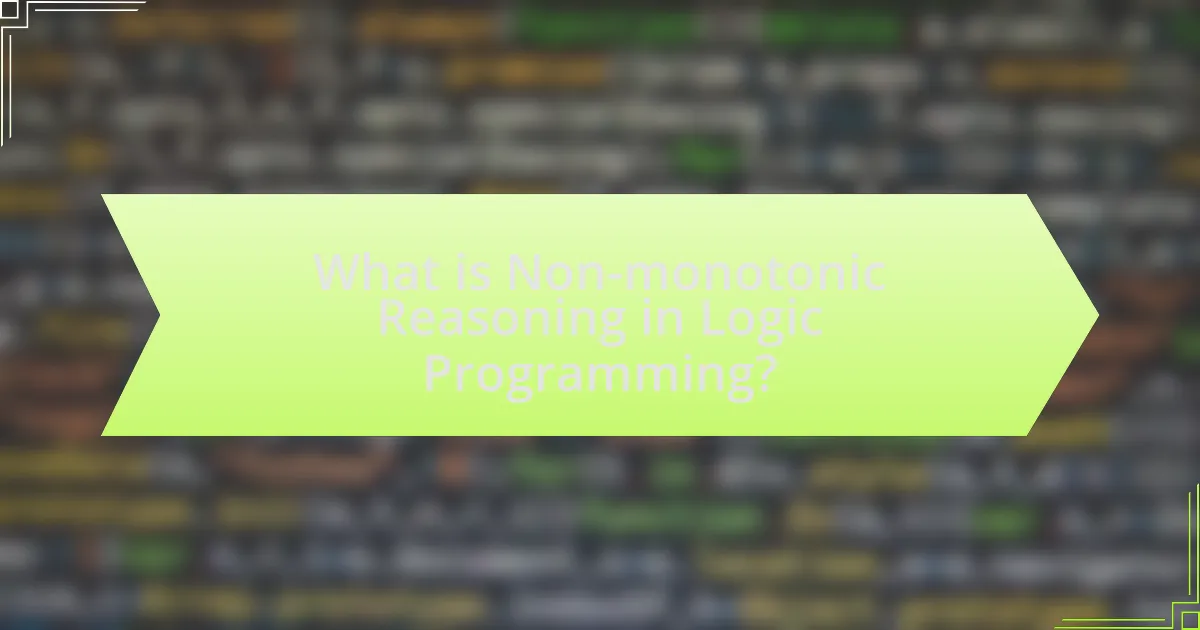
What is Non-monotonic Reasoning in Logic Programming?
Non-monotonic reasoning in logic programming refers to a type of reasoning where the introduction of new information can invalidate previous conclusions. This contrasts with monotonic reasoning, where once a conclusion is drawn, it remains valid regardless of additional information. Non-monotonic reasoning is essential in scenarios where knowledge is incomplete or subject to change, allowing for more flexible and realistic modeling of reasoning processes. For example, in artificial intelligence applications, non-monotonic reasoning enables systems to adapt their conclusions based on new evidence, reflecting how humans often revise their beliefs when faced with new data.
How does Non-monotonic Reasoning differ from traditional reasoning?
Non-monotonic reasoning differs from traditional reasoning in that it allows for the introduction of new information to invalidate previous conclusions. Traditional reasoning, often based on classical logic, maintains that once a conclusion is drawn, it remains valid regardless of additional information. In contrast, non-monotonic reasoning adapts to new evidence, reflecting real-world scenarios where knowledge is often incomplete or evolving. This adaptability is crucial in fields like artificial intelligence, where systems must revise beliefs based on new data, demonstrating the practical necessity of non-monotonic frameworks over static traditional approaches.
What are the key characteristics of Non-monotonic Reasoning?
Non-monotonic reasoning is characterized by its ability to allow conclusions to be withdrawn in light of new evidence. This type of reasoning contrasts with classical logic, where once a conclusion is drawn, it remains valid regardless of additional information. Key characteristics include the flexibility to revise beliefs, the use of default reasoning where assumptions are made in the absence of complete information, and the incorporation of context-dependent reasoning, which acknowledges that the truth of statements can vary based on different scenarios. These features enable non-monotonic reasoning to better model real-world situations where information is often incomplete or evolving.
Why is Non-monotonic Reasoning important in logic programming?
Non-monotonic reasoning is important in logic programming because it allows systems to make inferences that can be retracted when new information becomes available. This flexibility is crucial for modeling real-world scenarios where knowledge is incomplete or subject to change. For instance, in artificial intelligence applications, non-monotonic reasoning enables agents to adapt their beliefs based on new evidence, enhancing decision-making processes. The significance of this reasoning type is evidenced by its application in various domains, such as knowledge representation and automated reasoning, where it effectively handles exceptions and evolving information.
What are the foundational concepts of Non-monotonic Reasoning?
Non-monotonic reasoning is a type of logical reasoning where the introduction of new information can invalidate previous conclusions. The foundational concepts include the idea of default reasoning, where conclusions are drawn based on typical cases unless contradicted by specific evidence; the use of non-monotonic logics, such as circumscription and autoepistemic logic, which allow for reasoning with incomplete or changing information; and the concept of belief revision, which involves updating beliefs in light of new evidence. These concepts are essential for understanding how reasoning can adapt to new information, contrasting with classical logic where conclusions are fixed once established.
What types of Non-monotonic Reasoning exist?
The types of non-monotonic reasoning include default reasoning, assumption-based reasoning, and belief revision. Default reasoning allows for conclusions to be drawn based on typical cases, while assumption-based reasoning involves making assumptions that can be retracted if new information contradicts them. Belief revision refers to the process of changing beliefs in light of new evidence. These types are essential in logic programming as they enable systems to handle incomplete or changing information effectively.
How do defaults and exceptions play a role in Non-monotonic Reasoning?
Defaults and exceptions are crucial in non-monotonic reasoning as they allow for conclusions to be drawn based on typical cases while accommodating deviations. In non-monotonic reasoning, the introduction of new information can invalidate previous conclusions, which is where defaults serve as general rules that apply unless exceptions are specified. For instance, in a logic programming context, a default rule might state that “birds typically fly,” but an exception would clarify that “ostriches do not fly.” This framework enables systems to make flexible inferences that reflect real-world complexities, as evidenced by research in artificial intelligence that demonstrates how default reasoning can lead to more adaptive and realistic decision-making processes.
What are the applications of Non-monotonic Reasoning in Logic Programming?
Non-monotonic reasoning in logic programming is applied in various domains, including artificial intelligence, knowledge representation, and automated reasoning. In artificial intelligence, it allows systems to handle incomplete or changing information, enabling more flexible decision-making processes. Knowledge representation benefits from non-monotonic reasoning by allowing the representation of defaults and exceptions, which is crucial for modeling real-world scenarios accurately. Automated reasoning systems utilize non-monotonic reasoning to derive conclusions that can be retracted when new information is introduced, enhancing the system’s adaptability and robustness. These applications demonstrate the significance of non-monotonic reasoning in developing intelligent systems capable of reasoning under uncertainty.
How is Non-monotonic Reasoning applied in artificial intelligence?
Non-monotonic reasoning is applied in artificial intelligence to enable systems to make inferences that can be retracted when new information becomes available. This approach is crucial for handling incomplete or changing knowledge, allowing AI systems to adapt their conclusions based on updated data. For instance, in expert systems, non-monotonic reasoning allows for the revision of rules and facts as new evidence emerges, enhancing decision-making processes. The use of frameworks like Default Logic and Circumscription exemplifies how non-monotonic reasoning is implemented to manage uncertainty and provide more flexible reasoning capabilities in AI applications.
What role does Non-monotonic Reasoning play in knowledge representation?
Non-monotonic reasoning plays a crucial role in knowledge representation by allowing systems to draw conclusions that can be retracted when new information becomes available. This flexibility is essential for modeling real-world scenarios where knowledge is often incomplete or subject to change. For instance, in artificial intelligence applications, non-monotonic reasoning enables agents to adapt their beliefs based on evolving contexts, such as updating assumptions when new evidence contradicts previous conclusions. This adaptability is supported by frameworks like default logic and circumscription, which provide formal mechanisms for handling exceptions and revising knowledge.
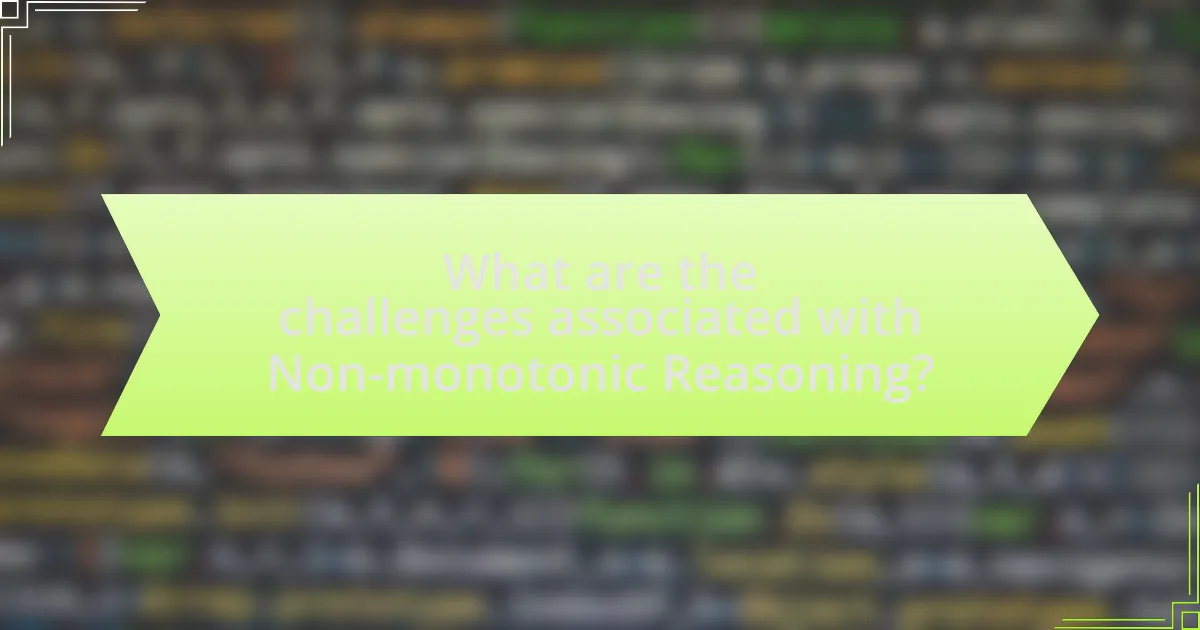
What are the challenges associated with Non-monotonic Reasoning?
Non-monotonic reasoning faces several challenges, including the difficulty of handling contradictions and the complexity of representing knowledge. These challenges arise because non-monotonic reasoning allows for the introduction of new information that can invalidate previous conclusions, leading to potential inconsistencies. Additionally, the computational complexity of algorithms used for non-monotonic reasoning can be high, making it challenging to implement in practical applications. Research indicates that these issues can hinder the effectiveness of non-monotonic reasoning in logic programming, as seen in studies that highlight the limitations of existing frameworks in managing dynamic knowledge bases.
What complexities arise in implementing Non-monotonic Reasoning?
Implementing Non-monotonic Reasoning introduces complexities such as the difficulty in managing contradictory information and the challenge of ensuring consistency in knowledge bases. These complexities arise because Non-monotonic Reasoning allows for the withdrawal of inferences when new information is introduced, which can lead to inconsistencies if not carefully managed. For instance, in systems like default logic or circumscription, the introduction of new facts can invalidate previous conclusions, necessitating sophisticated mechanisms to track and resolve these changes. Additionally, computational complexity increases, as reasoning tasks may require more resources to handle the dynamic nature of knowledge updates, making it harder to guarantee efficient performance in real-time applications.
How do inconsistencies affect Non-monotonic Reasoning systems?
Inconsistencies significantly undermine Non-monotonic Reasoning systems by leading to ambiguous conclusions and undermining the reliability of derived inferences. Non-monotonic Reasoning allows for the revision of beliefs when new information is presented; however, when inconsistencies arise, the system struggles to determine which beliefs to retain or discard. This can result in conflicting outputs, making it difficult for the system to maintain coherence in reasoning processes. For instance, in logic programming, the presence of contradictory rules can cause the system to enter a state of inconsistency, where it cannot confidently assert any conclusions, thus hampering its ability to function effectively.
What are the computational limitations of Non-monotonic Reasoning?
The computational limitations of Non-monotonic Reasoning include issues such as undecidability, complexity, and the difficulty of finding optimal solutions. Non-monotonic Reasoning often leads to problems where determining the validity of conclusions can be computationally intensive, as many reasoning frameworks exhibit NP-hard characteristics. For instance, the complexity of reasoning in default logic and circumscription can escalate quickly with the size of the knowledge base, making it impractical for large datasets. Additionally, the presence of multiple possible extensions or interpretations can complicate the reasoning process, leading to challenges in achieving consistent and efficient outcomes.
How can these challenges be addressed?
To address the challenges in non-monotonic reasoning in logic programming, researchers can develop more robust algorithms that enhance the efficiency and accuracy of reasoning processes. For instance, implementing advanced techniques such as answer set programming (ASP) can improve the handling of incomplete or contradictory information. Studies have shown that ASP can effectively manage non-monotonic reasoning by allowing for the representation of defaults and exceptions, thus providing a structured approach to reasoning under uncertainty. Additionally, integrating machine learning methods with traditional logic programming can further optimize reasoning capabilities, as evidenced by recent research demonstrating improved performance in complex reasoning tasks.
What strategies exist for managing inconsistencies in Non-monotonic Reasoning?
Strategies for managing inconsistencies in Non-monotonic Reasoning include the use of prioritized defaults, revision strategies, and contextual reasoning. Prioritized defaults allow for the establishment of a hierarchy among conflicting rules, enabling the system to choose the most relevant rule based on context. Revision strategies involve updating beliefs or knowledge bases to resolve inconsistencies, often through mechanisms like belief contraction or expansion. Contextual reasoning focuses on the specific circumstances under which certain rules apply, allowing for flexible interpretations that can mitigate conflicts. These strategies are supported by frameworks such as Default Logic and Answer Set Programming, which provide formal structures for handling inconsistencies effectively.
How can performance be improved in Non-monotonic Reasoning systems?
Performance in Non-monotonic Reasoning systems can be improved by optimizing the underlying algorithms and enhancing the representation of knowledge. Efficient algorithms, such as those utilizing heuristics or approximation techniques, can reduce computational complexity, allowing for faster inference. Additionally, employing more expressive knowledge representations, like default logic or circumscription, can lead to more accurate reasoning outcomes while minimizing the need for extensive backtracking. Research has shown that integrating these strategies can significantly enhance the efficiency and effectiveness of Non-monotonic Reasoning systems, as evidenced by studies demonstrating reduced processing times and improved accuracy in reasoning tasks.
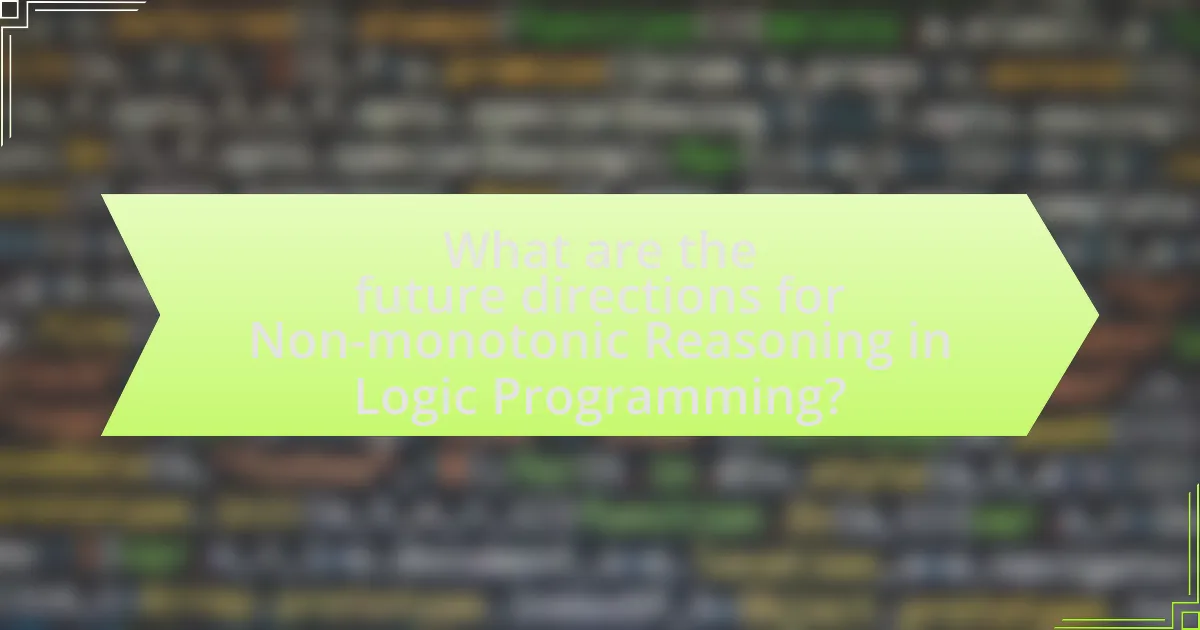
What are the future directions for Non-monotonic Reasoning in Logic Programming?
Future directions for Non-monotonic Reasoning in Logic Programming include enhancing integration with machine learning techniques, improving scalability for large datasets, and developing more robust frameworks for handling uncertainty and inconsistency. Research indicates that combining non-monotonic reasoning with machine learning can lead to more adaptive systems, as seen in studies like “Combining Logic Programming and Machine Learning” by Alferes et al. (2019), which demonstrates improved decision-making capabilities. Additionally, advancements in computational power and algorithms are expected to facilitate the application of non-monotonic reasoning in real-time systems, as highlighted in the work of Lifschitz (2020), which emphasizes the need for efficient reasoning under dynamic conditions.
What emerging trends are influencing Non-monotonic Reasoning?
Emerging trends influencing Non-monotonic Reasoning include advancements in machine learning, the integration of probabilistic reasoning, and the development of hybrid reasoning systems. Machine learning techniques enhance the adaptability of non-monotonic reasoning systems by allowing them to learn from data and improve decision-making processes. The integration of probabilistic reasoning introduces uncertainty management, enabling systems to handle incomplete or conflicting information more effectively. Additionally, hybrid reasoning systems that combine symbolic and sub-symbolic approaches are gaining traction, as they leverage the strengths of both paradigms to address complex reasoning tasks. These trends reflect a shift towards more flexible and robust reasoning frameworks in logic programming.
How is machine learning impacting Non-monotonic Reasoning approaches?
Machine learning is enhancing Non-monotonic Reasoning approaches by enabling systems to adaptively update their knowledge bases in response to new information. This adaptability allows for more flexible reasoning in dynamic environments, where traditional logic systems may struggle to accommodate changing facts. For instance, machine learning algorithms can analyze patterns in data and adjust the rules governing reasoning, thereby improving the accuracy and relevance of conclusions drawn from incomplete or evolving information. Research has shown that integrating machine learning with Non-monotonic Reasoning can lead to more robust decision-making frameworks, as evidenced by studies demonstrating improved performance in applications such as natural language understanding and automated reasoning tasks.
What advancements in technology could enhance Non-monotonic Reasoning?
Advancements in artificial intelligence, particularly in machine learning algorithms and computational power, could significantly enhance Non-monotonic Reasoning. Machine learning techniques, such as deep learning, enable systems to learn from data and adapt their reasoning processes based on new information, which aligns with the principles of Non-monotonic Reasoning where conclusions can be retracted in light of new evidence. Additionally, increased computational power allows for more complex reasoning tasks to be performed efficiently, facilitating the handling of larger datasets and more intricate logical frameworks. For instance, the development of neural-symbolic integration approaches combines neural networks with symbolic reasoning, enhancing the ability to manage uncertainty and change in knowledge bases, which is central to Non-monotonic Reasoning.
What best practices should be followed in Non-monotonic Reasoning?
Best practices in Non-monotonic Reasoning include ensuring clarity in the representation of knowledge, utilizing well-defined default rules, and maintaining consistency in the application of reasoning strategies. Clarity in knowledge representation helps avoid ambiguity, which is crucial in scenarios where conclusions may change with new information. Well-defined default rules provide a structured approach to handle exceptions, allowing for more robust reasoning. Consistency in reasoning strategies ensures that the same principles are applied uniformly, which is essential for maintaining logical coherence. These practices are supported by research indicating that structured frameworks enhance the reliability of non-monotonic reasoning systems, as seen in studies on logic programming methodologies.
How can practitioners effectively implement Non-monotonic Reasoning in their projects?
Practitioners can effectively implement Non-monotonic Reasoning in their projects by utilizing logic programming languages that support this reasoning style, such as Prolog or Answer Set Programming (ASP). These languages allow for the representation of knowledge that can change in light of new information, enabling systems to handle exceptions and revise conclusions. For instance, ASP provides a framework for defining rules and constraints that can dynamically adapt as new facts are introduced, which is essential for applications like automated reasoning and knowledge representation. This adaptability is supported by the theoretical foundations of Non-monotonic Logic, which emphasize the ability to withdraw inferences when faced with contradictory evidence, thus ensuring that the reasoning process remains robust and flexible.
What common pitfalls should be avoided in Non-monotonic Reasoning?
Common pitfalls to avoid in Non-monotonic Reasoning include assuming that conclusions drawn are always valid, neglecting the context of information, and failing to account for the possibility of new information altering previous conclusions. These pitfalls can lead to incorrect reasoning and flawed decision-making. For instance, in logic programming, overlooking the dynamic nature of knowledge can result in outdated conclusions being treated as definitive, which is contrary to the principles of Non-monotonic Reasoning that allow for the revision of beliefs based on new evidence.
